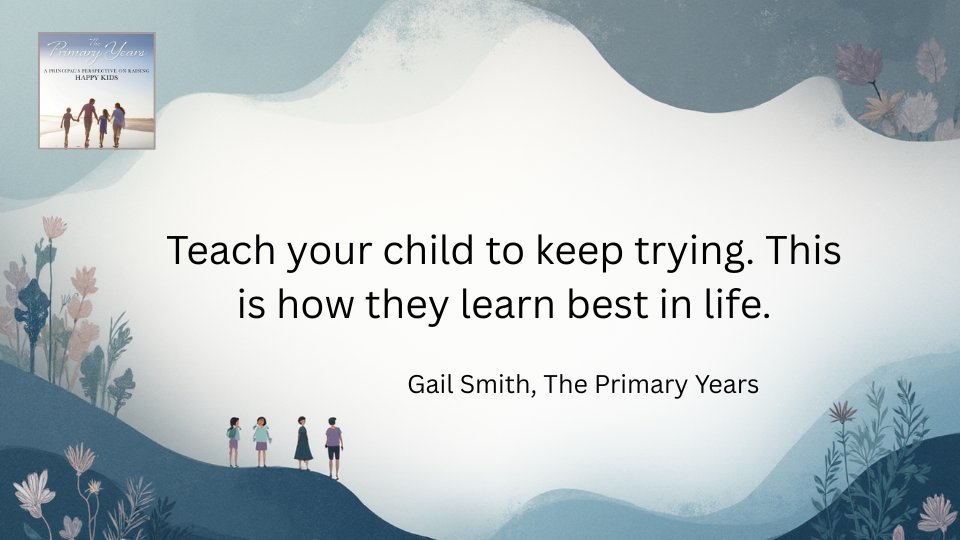
It’s All In The Effort We Make
Teach your child to keep trying. This is how they learn best in life.

Grandparents: A Special Role in a Modern Childhood
In our technology-driven age, grandparents provide something priceless: a human connection that grounds and guides. They are the storytellers, the wisdom-keepers, and the calm in the storm of modern life, offering support that is both different from and essential to what parents provide. This blog explores on how grandparents leave a lasting, positive imprint on a child's life.

Why Your Child’s Mental Health Matters
What's the one thing that influences your child's ability to learn, build friendships, and navigate challenges? It's not the latest educational toy or a packed extracurricular calendar. It's their mental health. Discover why creating a foundation of emotional safety is the greatest gift you can give your child.

Relax, Parents: Childhood Is a Long Journey, Not a Sprint
Parents often feel the pressure to be perfect, but raising children is really about creating a space where they feel trusted and free to grow. Allow them to try, even if they struggle, because each small moment of autonomy builds lasting confidence. Your calm presence is the foundation they need to learn, stumble, and thrive.

Emotional safety for your child gives them so much hope
A child’s sense of emotional safety shapes their world, how they learn, trust, and grow. By nurturing emotional safety today, you build the foundation for their mental and emotional strength for life.

Let the Homework Belong to Them: Smart Tips for Parents
Homework isn’t about perfect answers, it’s about your child learning to trust their own mind. The magic happens when we shift from fixing to supporting our children.

Be the Parent Who Models, Listens, and Grows
Kids notice everything, not just what you say, but how you live. The way you show love, handle stress, and treat others teaches them more than words ever could. In this blog, we explore how calm, caring actions can shape your child’s emotional wellbeing in powerful ways.

Growing Big Hearts: Teaching Children Generosity and Compassion
As parents, the way we show compassion in everyday moments helps shape emotionally strong and caring kids. Gail Smith shares simple ways to nurture generosity at home, where small acts can leave a big impact.

The Little Things That Matter Most: How Small Moments Shape Your Child’s World
As parents, we often feel pressured to do something grand to make a real difference. But the truth is, the small, everyday moments leave the deepest imprint. Here are some simple ways you can make a big impact in your child’s life, one little action at a time.

Raise a Hopeful Child: The Power of a Proactive Parent
Tired of always reacting to meltdowns and lost lunchboxes? What if you could shape how your child sees the world instead? In this blog, we explore how small, proactive steps can build resilience and boost your child’s mental health.

Raising a Confident Child in Today’s Classroom: 5 Surprising Ways Parents Can Help
Confidence is a skill, not a trait and it grows with practice, praise, and patience. Every child develops it differently, and that’s okay. Explore the five simple ways to support your child’s confidence in today’s classroom.

Simple ways to help your child with their anxiety issues
Today’s children are growing up in a world filled with pressure from school demands to social media and even the stress they sense from adults. It’s no surprise that anxiety is becoming more common in younger children. The good news? We can teach them how to cope and thrive. Building resilience doesn't mean they'll never face challenges. It means they'll have the tools to bounce back, try again, and keep moving forward. And that’s one of the greatest gifts we can give them.

As a parent remember to listen well
Children learn by example, and when parents practice active listening, they teach valuable communication skills. When a child feels heard, they understand that their thoughts and feelings matter, building their confidence and sense of self-worth. Gail Smith shares five compelling reasons why truly listening to your child is essential for their emotional and social development.

How to Support Your Child’s Mental Health Through School Without Over Complicating It
Supporting your child’s well-being doesn’t have to mean long lectures or expensive therapies. Gail Smith shares simple yet effective ways that you can apply to make a real difference in supporting your child's mental health.

Encourage a Wide Net of Friends: Why It Matters.
Friendships are key to a child’s happiness, but relying on just one best friend can lead to heartbreak. Gail Smith highlights why encouraging kids to embrace new friendships is so important.

It’s all in the effort with Parenting
Your child doesn’t need a perfect parent. They need an authentic one. The love, dedication, and effort you pour into each day mean far more than striving to get everything right.

Helping Your Child Navigate Friendships and Challenges
Navigating friendships, forming them, losing them, and finding new ones is a natural part of childhood and essential for social and emotional growth. Here are five impactful ways parents can guide their children in fostering strong, healthy friendships and overcoming the challenges that come with them.

Five simple but practical ideas for parents to find a balance between a busy life and dealing with school matters.
Balancing work, life, and your child’s school commitments can feel overwhelming, but it doesn’t have to be. Gail Smith shares five simple yet practical tips to help busy parents stay engaged with their child’s education while managing their own demanding schedules. While perfection may be out of reach, these strategies can help you find a better, more manageable balance.

5 TIPS TO REDUCE ANXIETY IN YOUR CHILD WHEN STARTING SCHOOL
Starting a new school year can be a big adjustment, especially for kids feeling a little nervous. As a parent, you can help ease their worries and boost their confidence with simple strategies. A smooth start sets the tone for a great year ahead! Gail Smith shows you how you can support your child through this transition.

Five simple but powerful tips for parents to help their child start school on a positive note
With school reopening soon, take a moment to chat with your child about their holiday highlights and what they'll miss. This helps them transition from break to school. Ask them what they're excited about, whether it’s seeing friends or new activities. These simple conversations can set a positive tone for the new school year.